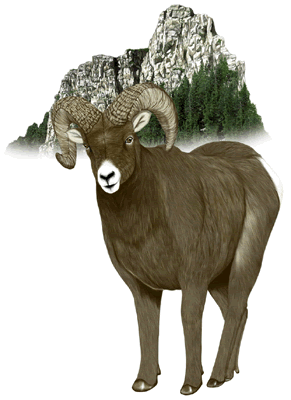| 環境関連サイト | GPお勧めの環境関連サイトをお訪ねください!
|
|
| ビッグホーン・シープからの手紙 : ハロー フロム ラスベガス | 投稿者 river-rat 投稿日時 2003-4-11 17:01:53 (1443 ヒット)

|
 | クリス・ローリー 野生動物調査員
ラスベガスの国立公園に生息する「ビッグホーン・シープ」の生態調査を行っている野生生物学者。日本文化に親しみ、合気道や茶道をたしなむ。 |
みなさん、こんにちは。クリス・ローリーです。私はアメリカ南西部で、野生動物について調査をしている生物学者です。私の仕事は、野生生物および野生の生息地の保護をすることです。現在私は、カリフォルニア州のユッカ国定公園[http://www.nps.gov/jotr/]で、ビッグホーン・シープ(オオツノヒツジ羊 Ovis Canadensis 以下ビッグホーン)の生態に与える、ハイキングやマウンテンバイク、ロッククライミングなどのレクレーションによる影響の調査をしています。南西部のビッグホーンのなかには、絶滅の危機に瀕しているものもいます。人間の活動が、彼らに与えるインパクトの深刻さは、無視できない問題です。
 なぜビッグホーンの生態調査が重要な問題なのか― なぜビッグホーンの生態調査が重要な問題なのか―
それは私たち生物学者が、まず最初に聞かれる質問でしょう。もちろん、さまざまな考え方があるでしょう。野生生物学者として、私はビッグホーンを追いかけて長い時間を過ごしています(ときには砂漠の中でたった独りでいることも)。彼らの振る舞いや習慣を調べながら、私はしばしば私自身に同じ質問をします。
こんなことがいったいなんの役に立つというのか―
この質問をもう少し広げてみましょう(このエッセイに興味を持っていただけるように)。それはそんなに難しいことではありません。ほんのちょっとの時間でかまいませんので、みなさんの周辺を見まわしてください。窓の外を見たり、通りを歩いたり、壁にかかった絵を見てください。あなたを取り囲むものの中で、何があなたに「喜び」「癒し」「幸せ」といった感覚をもたらしてくれますか?自分自身に質問してください。それは歩道のコンクリートですか。それは近所を通る送電線ですか。それは仕事へ行く途中の渋滞や雑踏ですか。少なくとも私にとっては、それらの風景に心が満たされることはありません。
では何が本当に重要なのでしょう?どんなにあわただしい都会の暮らしでも、私たちにとって大切なものや場所は見つけることができます。それは静かな公園だったり、青い川、机の上で咲き乱れる新鮮な花束、バス停にぽつんとたつ木で歌う鳥、どこか遠い森の中でエサを探す虎(を想像したり)、あるいは机の上に飾られた山の写真立てかもしれません。これらは、人としての精神性を保つためにもとても重要なものです。それらが失われつつある今、その価値は更に高まっています。
自然のことを考える時間を持つことが、私たちの暮らしにどれほど安らぎをもたらすか、考えてみてください。自然がどれほど大切で、私たちとどれほどつながりの深いものか、ということをじっくりと考える時間を持っていただきたいのです。そういうことのできる所は、案外みなさんの近くにあるかもしれません。家の近くの広場は、私たちが普段なにげなく過ごしているこの消耗社会について、改めて考えさせてくれるかもしれません。もしかしたらそれ以上の存在になるかも。もしかしたら、その空き地は、私たちが自分たちの手で守っていくことのできる、大切な場所となることができるかもしれません。そしてその場所は、この美しい地球に生きる喜びを、改めて感じさせてくれるかもしれません。
そうです、私の仕事も、みなさんの暮らしも、全てはひとつに繋がっているのです。
(翻訳:リバーラット)
(原文)
Hello!! My name is Chris Lowrey and I’m a wildlife biologist in the southwestern United States. My work and interests involve the conservation of wildlife and wild places. Presently, I am studying the effects of recreation (hiking, biking, rock climbing, etc.) on bighorn sheep (Ovis Canadensis) behavior in Joshua Tree National Park, California ( http://www.nps.gov/jotr/ ). The bighorn are endangered in some areas of the southwest, and the impact of human activity on their ability to survive is an important issue.
Why is it important? This is the first question that must be asked about our relationship to nature. The answers are many, of course. As a wildlife biologist, I spend a lot of time alone in the desert, following bighorn. As I’m documenting their behavior and habits, I often ask myself this same question: Why is this important?
Let’s expand this question to include everyone interested enough to read this essay. This is actually a simple task. Take a moment to look around. Look out the window, down the road, at a picture on the wall. What about your surroundings brings you a sense of enjoyment, a sense of well-being, or of happiness? Ask yourself; is it the concrete of the sidewalk? Is it the power lines running through your neighborhood? Is it the traffic and congestion on your way to work? I can only speak for myself, but these are not the kinds of surroundings I appreciate most.
So what is really important? Even if we live in a crowded city, there are objects and areas that are deeply important to us. A quiet park, a blue river, a fresh bouquet of flowers on a desk, birds singing on a lone tree at the bus stop, tigers hunting in a forest far away, or a photograph of a mountain on your desk. These are, personally, spiritually, the important things, and they become so much more important as they become even rarer.
I hope each of us will take a few minutes to think about how we can improve our lives by making time for nature. I hope we can spend a moment to really think about how important the environment, and especially our connection to it, really is. Perhaps there is a place near you where you can reestablish this connection. Perhaps an open field near our homes, a field we barely think about as we pass during our hectic lives, can become something more. Perhaps an open field can become a garden, a garden where we can conserve, in our own way, a place that is important, and reconnect to the beauty that is our earth.
|
|
|
|
|
|